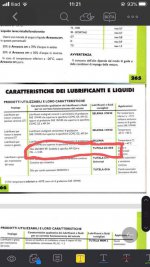I just found my booklet which clearly says to use only Tutela ZC75 to all the punto mk1 models.
Which is GL5 + EP based.
From what I've read on the forums, some says to yse GL4 without EP..
My booklet also says the tutela os 75w90 but it's actually 75w80.
Whilst I would not presume to know "everything" about the vast subject which is lubricants, I have taken a great interest in this subject and I hope I can contribute a wee bit here. Your manual is recommending Tutela ZC75 synth which it defines as an API GL5 with a viscosity (loosely meaning "thickness") of 75w 90. The EP stands for extreme pressure and means there are additives in the oil to combat high pressure contact - ie between gear teeth etc, where shearing forces can be very high.
API is the American Petroleum Institute a very highly regarded organisation who test the quality and performance of lubricants and give then an API rating. In Europe we have the ACEA who do a similar thing and some think, for us, the ACEA rating is actually better? You pays your money and takes your chances I suppose?
So, in an attempt to break down the info from your manual's recommended Tutela ZC75 synth:
1) Tutela? An oil brand made now by Petronas. you could choose anything, Shell, Mobil, Castrol, Fuchs, etc, etc, which had the same specification (ie API GL5 75w-90 which is the important bit).
2)API GL5? if that's what your book says then that's what you want to look for. API GL5 was the subject of a very big "scare" a few years ago when it was discovered that some of the anti-friction additives in it (which hadn't been in the older GL4 spec) were damaging the softer "yellow metal" - so stuff like brass and phosphor bronze. Some people would say it was dissolving it, it was actually more complicated than that but the effect was similar and cause abnormally fast degredation of important parts like synchro rings and thrust washers. The problem was that many people, including those who should have known better like retailers, thought that the "newer spec oil would be better in protecting older boxes from wear due to the "stronger" anti friction additives so were recommending their use. It would seem that the manufacturers quite quickly caught up with the problem and modified their formulations to stop these problems. So, as far as I've been able to find out, in theory, you are now OK to use a GL5 in a box where GL4 is specified? I wouldn't though. If my manual specified a GL4 I'd use a GL4! The oil for my Panda has a particularly interesting spec of GL4 plus! API don't actually specify a GL plus - just GL4. So what's that all about? I've seen someone who was speculating that it's actually basically a GL5 with the anti friction advantages that implies but Petronus have elected to brand it a GL4 plus so as not to frigten us "oldies" who remember the scare around GL5! who knows?
3) 75w-90. This is the viscosity, roughly interpreted as "thickness/ resistance to flow". The higher the number the greater the resistance to flow. So 75w-90, what does it mean? The "w", as far as I know, stands for "winter" but is better thought of as meaning "cold". So this particular oil has a viscosity index of 75 when cold (quite thin so flows easily - a desirable thing as the oil will quickly get to where it's needed) and the same viscosity as a hot 90 weight oil when hot. (This would seem to say that the box actually needs a 90 weight oil when it's up to running temperature and the oil has thinned with heat, but a 90 weight oil would be relatively treacle like when cold so bearings and bushings would not be lubricated properly and changing gear would be like stirring a pot of thick porridge! By using polymers to construct a 75w-90 the oil will have the characteristics of a 75 weight oil when cold but of a 90 weight oil when hot, then you can mix up a variety of additives to reduce wear and oxidation and lots of other "stuff" which further improves the performance.
The more viscous the oil the slower it will be to circulate to all the bits it needs to protect and the greater the drag on the gears and bearings so, of late, and because the quality of both synthetic oils and their additive packages are improving all the time, oils have been getting "thinner". Thinking about engine oils for instance, Honda I noticed the other day are specifying a 0w-20 engine oil for some of their newer cars now - back in the '50's it would typically have been a straight 30 weight in the summer and a change to a 40 weight in the winter. The in the '60's multigrades became common so we didn't need to change oil twice a year, and you would have been pouring a 20w-50 into your Cortina/Anglia/Mini. Our wee FIRE 8 valves to day run very happily on 5w-40 so nice and thin to get circulating when cold but with the "thickness" of a hot 40 weight when hot for added protection. The same seems to be applying to transmission oils. My old SEAT Cordoba ran on a relatively thick 80w-90 gear oil. I change gear oil roughly every 5 years/50,000 miles, whichever comes first (don't believe in "for life" fills) and last time I changed it I bought the genuine VAG recommended oil from TPS (so genuine VAG supplier) and it worried me a lot because it was like water compared to the older oil. I double checked and the recommendation was now to use the newer oil. So, with great trepidation, I did. It greatly improved the gear change which was now "super slick" compared to before. I fancy there was just a "tad" more gear whine, but I'm splitting hairs and she went on to cover many thousands more miles without a problem. I'm mentioning this because your Tutela ZC75 was quoted in your manual as a 75w-90 but looking at the Petronas spec:
https://extranetpli-eu.pli-petronas.com/dsp/pdf/eng/scat/1475_scat_eng.pdf it now seems to be a 75w-80? This might well be because the improvement in the oil itself has permitted the same protection but with a slightly thinner viscosity with the associated gains in fuel consumption and gearbox operation.
So what is the conclusion? I think the old saying that "Mother knows best" was never truer. Buy the exact oil the manufacturer recommends if you want to be absolutely "bullet proof" It's what I tend to do. My number one supplier is Shop4parts:
https://www.shop4parts.co.uk/?name=store&op=Product&ProdID=72 who have never failed me. The manufactureres themselves have excellent "look up" lists where all you need to do is feed in your reg no or vehicle details to get their recommendation and there are independants, like Opie oils, who also have the same service and where you can often buy at a discounted price. I'm a bit more "liberal" with engine oils - running most of the "family fleet" on Fuchs oils just now but always to the exact manufacturer's spec.
At the end of the day it's the API (or ACEA) spec and the viscosity which should rule your choice and because there are so many oils now which are almost "vehicle specific" I like to go, especially with transmission oils, for the actual manufacturer's recommended product. After all, how often do you change a gearbox's oil? not often eh? so a pound or so extra on the bill for the peace of mind it gives is, I think, an extra pound well spent!
Hope that was helpful? stay safe everyone
regards
Jock



